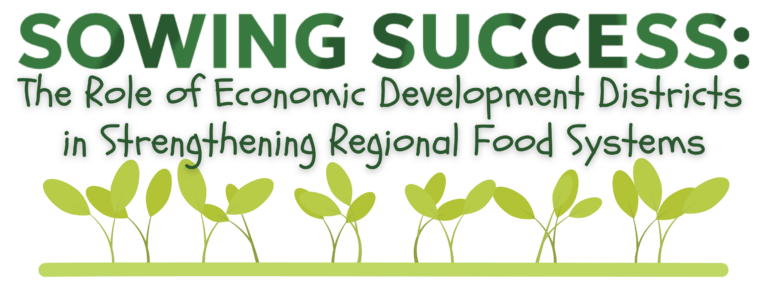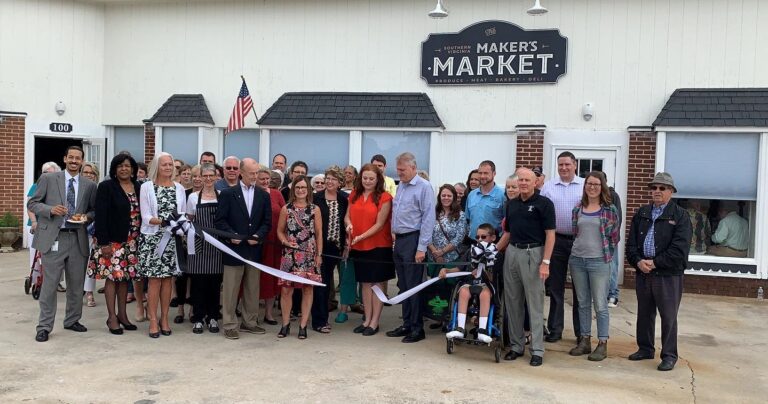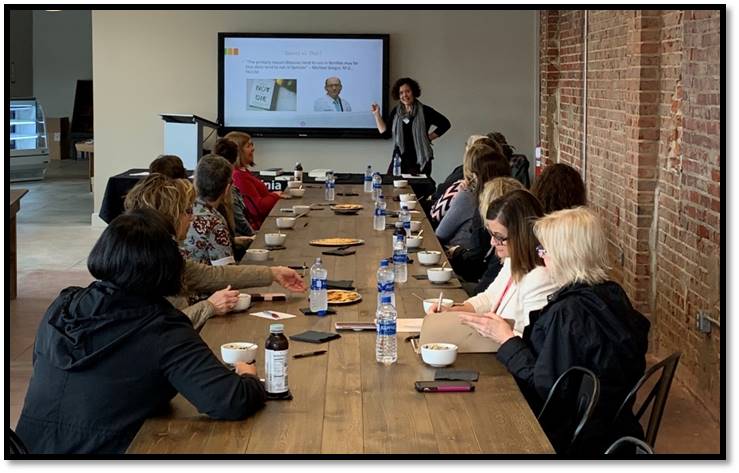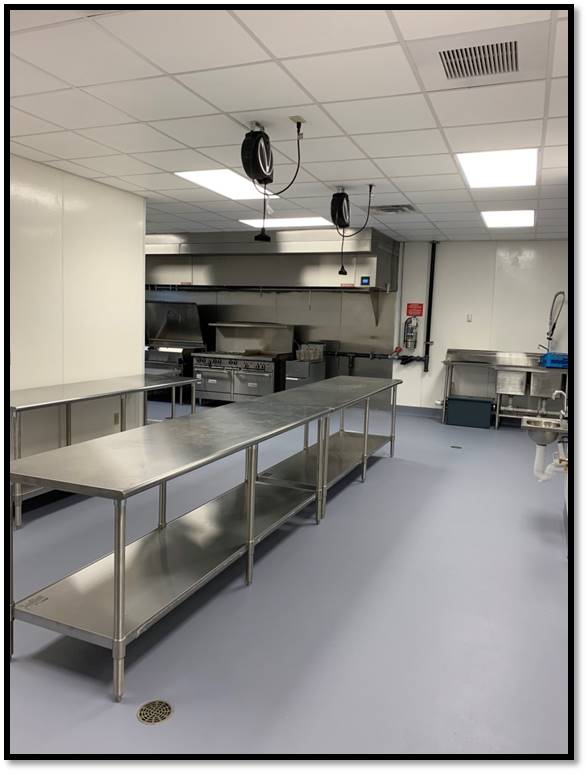
Case Study: EDD as Facilitator of Food Hub Development in Southern Virginia

Ann Taylor Wright lives on a large farm, “raising every type of animal you can imagine for direct marketing.” She was selling her meat through the local South Hill farmers market, but the profit margins were too tight. She realized she needed a commercial kitchen to give her the capability of adding value to her meat through further processing. Vendors at the farmers market would offer leftover produce to feed her pigs; she explained that they were losing money and could consider leftover produce as an ingredient for value-added products, like soup. A commercial kitchen would provide opportunities for all these producers to create value-added products.
Southside Planning District Commission (PDC) is an Economic Development District (EDD) serving 14 counties in south central Virginia. Deborah Gosney is the Executive Director of Southside PDC and was a frequent visitor to the farmers market; Ann would tell her about the need for a food hub, which would be a great community project, in an area with a variety of vacant underutilized buildings.
Through this work of developing a food hub, Ann built her own skills in grant writing and project management by learning from Deborah and Southside PDC staff. Together, they were able to secure almost $1 million in grant funding to establish, revitalize and outfit the Southern Virginia Food Hub & Makers Market. Southside PDC was able to use grant funds to renovate and outfit an empty corner building in downtown South Hill to host the new food hub and market space; the food hub building is town-owned and located next to a recently revitalized historic theater.

The Southern Virginia Food Hub & Makers Market space is now home to community classes around healthy eating and cooking, as well as those targeted to food-related businesses. The 4H youth in the Mecklenburg County Public Schools can use the kitchen to do community classes for kids. The space offers a community room for classes, the retail grocery section, and a commercial kitchen with walk in freezers, coolers, ovens, stoves, and other kitchen equipment people can use to support their businesses.
While sourcing the initial grant funding was a big win for Southside PDC and local producers, operating expenses and cash flow problems at the food hub became an issue. Ann and Deborah learned that a public-private partnership is more likely to make a food hub financially feasible. Ann and Deborah approached a local butcher shop owner to see if they were interested in being part of a public-private partnership to operate the food hub. In March 2024, Farmhouse Butchery took possession of the Southern Virginia Food Hub & Makers Market facility in South Hill. Farmhouse Butchery specializes in local, farm-raised beef, pork, poultry, and fresh seafood. Owners Zach and Victoria Harris operate Harris Farm Grown in conjunction with Farmhouse Butchery to provide top-quality black angus cattle raised on organic pastureland to their customers. Being co-located with the hub is beneficial for both parties, as the Harris’ can offer a variety of items along with their meat products, making it a one-stop shop for locally produced food items. At the South Hill location, Farmhouse Butchery will offer specialty items, continued educational classes in the existing classroom, producers’ use of the commercial kitchen, and continued partnerships with local farmers to provide fresh meats, produce, and products grown or made in Southern Virginia and North Carolina.

The soft opening occurred in Spring 2022, and the facility will have a lunch counter offering sandwiches and take-home meals. To fill out the local produce and products grocery store section of the food hub, Farmhouse is attempting to engage more local meat producers and vegetable growers. Farmhouse will be buying wholesale from local producers and selling the products through the retail grocery store. The commercial kitchen can also be rented out to serve food entrepreneurs interested in wholesaling who need an inspected kitchen to add value to their products. Prior to this, there were no inspected kitchens in the area. The new kitchen has allowed those selling through the farmers market to consider expanding beyond the farmers market. According to Ann, the main mission is “to increase access to local food beyond the four hours on Saturday morning that the farmers market runs. As a farmer and as a consumer, there needed to be more access.”
Southside PDC’s job in all of this was as a facilitator, grant writer, and convenor. Ann came to Deborah with the idea but no experience in grant writing or grant agencies. Southside PDC helped to facilitate the process, worked with the local government to secure their permission to use the building, assisted with grant writing and grant administration, and supported Ann in making it happen. Mostly, the PDC helped to connect the pieces; according to Ann, “I never would have known how to put those pieces together.” The PDC and Ann helped to build the project management team, which included the town, the South Hill Community Development Authority (CDA, the community development arm of the town), Southside PDC, local farmers and producers, and the South Hill farmers market. The project management team dissolved after the rehabilitation of the building was completed, however, the Food Hub now has its own Board of Directors to support its continued success.
The funding included:
Lessons learned:

© 2022 National Association of Development Organizations (NADO) and the NADO Research Foundation. All Rights Reserved.
Regional Development Researcher Andrew Coker joined the NADO team in March of 2023 after spending two and a half years as the Regional Economic Resiliency Coordinator at West Central Arkansas Planning and Development District. Andrew holds a bachelor’s degree from Hendrix College and a master’s degree from the University of Arkansas Clinton School of Public Service.
At NADO, Andrew conducts research on the newest economic and community development best practices from Economic Development Districts across the country. He helps produce easily digestible information on complex regional issues through case studies, tip sheets, and research reports. Andrew also hosts training and professional development opportunities including conference sessions and virtual webinars for member regional development organizations.
Andrew is one of our Missouri-based team members and enjoys reading and training for his next triathlon.
Jack Morgan came to the NADO team in 2022 after seven years with the National Association of Counties (NACo) as a Program and Senior Program Manager. Prior to NACo, Jack was a Policy Analyst for Friends of Southwest Virginia. Jack holds a bachelor’s in geography from Emory & Henry College and a master’s in geography from Appalachian State University.
As a NADO Senior Program Manager, Jack leads capacity-building and peer-learning work supporting energy communities in economic transition, regional resilience, and recreation economies. He also helps with the EDA-Austin training program Emerging Leaders.
Jack is certified by the American Institute of Certified Planners (AICP) and is a member of the American Planning Association (APA) in the Regional & Intergovernmental Planning division. He also serves on the Emory & Henry College Alumni Board.
Taking road trips, reading non-fiction, and indulging in top-notch barbecue and coffee round out Jack’s days. He loves maps, mountains, and of course, all things sports.
Karron Grant joined the NADO team in 2023 as Administrative Specialist and is the first face (or voice) you’ll see or hear when reaching out to NADO. As Administrative Specialist, Karron manages our database and coordinates NADO event operations. He ensures members’ needs are met, contact information stays current, and NADO’s office is running efficiently.
Karron came to NADO after four years in the classroom teaching at The New Century School and Old Mill Middle North where he received the Patriot of the Year award. He attended Towson University and the University of Maryland Global Campus and holds a bachelor’s in international studies and humanities.
Visiting art galleries and museums, playing basketball and bowling, and taking in movies and music are some of Karron’s interests and hobbies.
Deputy Executive Director Laurie Thompson has been with NADO for 25 years. Laurie helps keep the NADO and NADO Research Foundation wheels turning through management of the daily operations of the Research Foundation, securing financial resources and overseeing grants management, and helping execute NADO’s Annual Training Conference each year.
Laurie holds a bachelor’s in public affairs and government from Mount Vernon College and a master’s in health services administration from The George Washington University. Prior to NADO, Laurie spent time as a Field Specialist and an Eagle Staff Fund Director at First Nations Development Institute.
When she’s taking a rare reprieve from her NADO work, Laurie enjoys traveling domestically and internationally to visit friends and family.
Jamie McCormick joined the NADO team as a Policy Fellow first in 2019, then moved into her current role as Legislative Associate in 2021. As Legislative Associate, Jamie keeps NADO members apprised of any policy and regulatory issues and communicates NADO’s policy priorities to federal stakeholders and partner organizations. She is also the first stop for members with inquiries on policy issues. The planning and execution of NADO & DDAA’s annual Washington Conference is also managed by Jamie.
Jamie holds a dual bachelor’s in political science and international relations from The State University of New York College at Geneseo and a master’s in international development studies from The George Washington University. In addition to her roles at NADO, Jamie also worked as a Legislative Assistant for the Northeastern Retail Lumber Association.
Outside of her NADO work, Jamie is an active volunteer with the VOLO Kids Foundation and a fundraiser for YMCA youth programs. She is also NADO’s resident baker regularly providing treats for those in NADO’s D.C. office. Traveling, taking her pup on walks, and hiking in the northeast keep Jamie busy.
Brett Schwartz began at NADO in 2012 as a Research Fellow after earning his J.D. from the University of Baltimore School of Law. The following year, he was promoted to Program Manager and has now been leading as an Associate Director since 2018. Brett is responsible for managing NADO’s Economic Development District Community of Practice (EDD CoP), as well as researching and monitoring the latest trends in regional economic development and resilience, including best practices for the Comprehensive Economic Development Strategy (CEDS). With more than a decade of experience on the NADO team, Brett is a dynamic relationship builder helping connect and build capacity among the national network of regional development organizations.
Brett also holds a bachelor’s degree from Georgetown University and a master’s from Trinity College Dublin, as well as a certificate in mediation training. He’s a member of Catalyst Grantmakers of San Diego and Imperial Counties and was a participant in the 2021-22 Field Trips to the Future Cohort.
Brett is one of NADO’s West Coast team members residing in San Diego, CA where he enjoys spending time outdoors, attending concerts and festivals, and soaking up life as a parent of two young children.
Communications Manager Katie Allison joined the team in 2023 to lead the strategic communication efforts of NADO. Katie creates and develops print and online materials, communicates NADO’s updates to members via weekly emails, and maintains content for nado.org and NADO’s social media channels. She also works with different departments to generate new ideas and strategies to effectively describe and promote the important work NADO is doing for EDDs and RDOs across the country.
An experienced nonprofit communications professional, Katie has worked for organizations in western North Carolina for nearly a decade. She holds a bachelor’s in communications from Wingate University where she was a four-year student athlete. Katie has also completed Vision Henderson County, a comprehensive leadership development program that promotes informed and committed civic volunteerism.
Katie stays busy trying to keep up with her two young sons whom she enjoys exploring the Blue Ridge Mountains with. Traveling to new and favorite places and cheering on the Atlanta Braves are some of her family’s favorite pastimes.
Senior Program Manager Ciara Ristig has been a member of the NADO team since 2021, and helps with NADO’s EDD Community of Practice, EDD staff capacity building and other grants on a range of subjects, including equity and solar energy. Before NADO, Ciara worked as a Planner for the County of Santa Barbara and an Assistant Project Manager for REM Consult. Ciara holds a bachelor’s in urban studies and French from Bryn Mawr and a master’s in urban studies from Ecole d’Urbanisme de Paris.
When she’s not traveling, you can find her outrigger paddling and serving on the board of the Blue Sky Center in New Cuyama, CA, near her home base of Santa Barbara.
Carrie Kissel has been a member of the NADO team since 2005 when she began as a Research Fellow. She later moved into the roles of Program Manager in 2006, and then Associate Director in 2011. Carrie holds a bachelor’s in anthropology from Ball State University and a master’s in public anthropology from American University. As Associate Director, Carrie oversees NADO’s work in rural transportation and rural wealth creation. She provides technical assistance and support to rural regions on transportation and economic development issues and develops training and peer exchange events on transportation issues and rural wealth creation as an economic development strategy.
Carrie is a member of the Transportation Research Board (TRB) and secretary of TRB’s Rural Transportation Issues Coordinating Council. She is also a member of the American Anthropological Association and the National Association for the Practice of Anthropology.
Reading, gardening, hiking, and kayaking are a few of Carrie’s hobbies, and she organizes and facilitates a DEI/social justice-focused book club in her community.
Melissa Levy has worked at NADO as a Regional Development Researcher since February 2023 and is the Principal Consultant at her own firm specializing in wealth-based economic development consulting. With a career spanning nearly 30 years, Melissa brings a breadth of knowledge to her role as a Regional Development Researcher. Melissa provides in-depth research, coaching, and training on regional economic resilience, rural wealth creation strategies, and economic development.
Melissa is a North American Food Systems Network trained AgriCluster Resilience and Expansion (ACRE) facilitator and a WealthWorks coach, facilitator, and trainer. In addition to her professional work, Melissa serves on the Vermont Urban and Community Forestry Council, on the board of the Hinesburg Community Resource Center, and on the Hinesburg Economic Development Committee.
A true outdoorswoman, Melissa enjoys cross country and downhill skiing, paddleboarding, hiking, biking, and kayaking, as well as yoga, and teaching Tai Chi.
Program Manager Krishna Kunapareddy began her role with NADO in February of 2023 after 14 years of service at Boonslick Regional Planning Commission in Missouri. Krishna manages NADO Research Foundation’s Planning and Environmental Linkages and Center for Environmental Excellence projects. In addition to researching and writing, Krishna also conducts virtual workshops on innovative tools and techniques related to transportation planning.
She holds an undergraduate degree from Andhra University and a master’s from JNT University in India, as well as a master’s in city and regional planning from the University of Texas at Arlington. Krishna is also a certified Smart Cities Academy Practitioner and holds the Location Advantage certificate from geographic information system software company ESRI.
In her spare time, Krishna volunteers with Mentors4College helping high schoolers better plan for their post-high school paths. She is also a dedicated advocate for documented H4 Dreamers.
Krystal DeLeon joined the NADO team in October of 2020 as Database & Grants Manger, but in January of 2022 transitioned to her current role as Operations Manager. Krystal keeps NADO running through behind the scenes work of invoicing, solving any database issues that may arise, producing membership reports, and much more. Her organizational skills and thorough knowledge help the NADO team operate more efficiently across all departments.
Prior to NADO, Krystal was the Conference Services Coordinator for State Services Organization. She is a Certified Meeting Professional (CMP), a licensed realtor, and holds a bachelor’s in psychology from Liberty University. When she’s not keeping NADO’s operations in order, Krystal enjoys running and rock climbing, and adventuring with her husband and son.
Senior Program Manager Bret Allphin joined NADO in April of 2022 bringing with him a wealth of knowledge after a 20-year career with Buckeye Hills Regional Council in Marietta, Ohio. In addition to his bachelor’s in political science and master’s in public affairs, Bret is licensed Geographical Information Systems Professional (GISP). He is NADO’s go-to team member for all things mapping while also supporting members with transportation and economic development technical assistance services.
An avid sports aficionado and former collegiate athlete, Bret enjoys cheering on his Cincinnati Reds, hitting the trails on his mountain bike, and improving his golf game whenever possible. Bret is an involved community member in Marietta dedicating much of his spare time to serving on local nonprofit boards.

Applications cannot be saved and returned to at a later time. It is recommended you compile all of your information in advance in a word processor and cut and paste into the application below.
Joe McKinney serves as Executive Director of the National Association of Development Organizations (NADO). Headquartered in Washington DC, NADO provides advocacy, education, research, and training for the nation’s 500+ regional planning and development organizations.
Joe has thirty-one years of experience having served in city, county, regional, national association, and government management since 1991. He holds a bachelor’s degree in Public Policy Analysis from the University of North Carolina at Chapel Hill and is a candidate for a master’s degree in Public Administration from UNC-Chapel Hill.
McKinney has provided congressional testimony on numerous occasions regarding the importance of regional development organizations in helping shape the nation’s economic growth. He is nationally recognized for promoting innovative solutions in areas such as planning and economic development, workforce development, transportation and transit, and aging services.